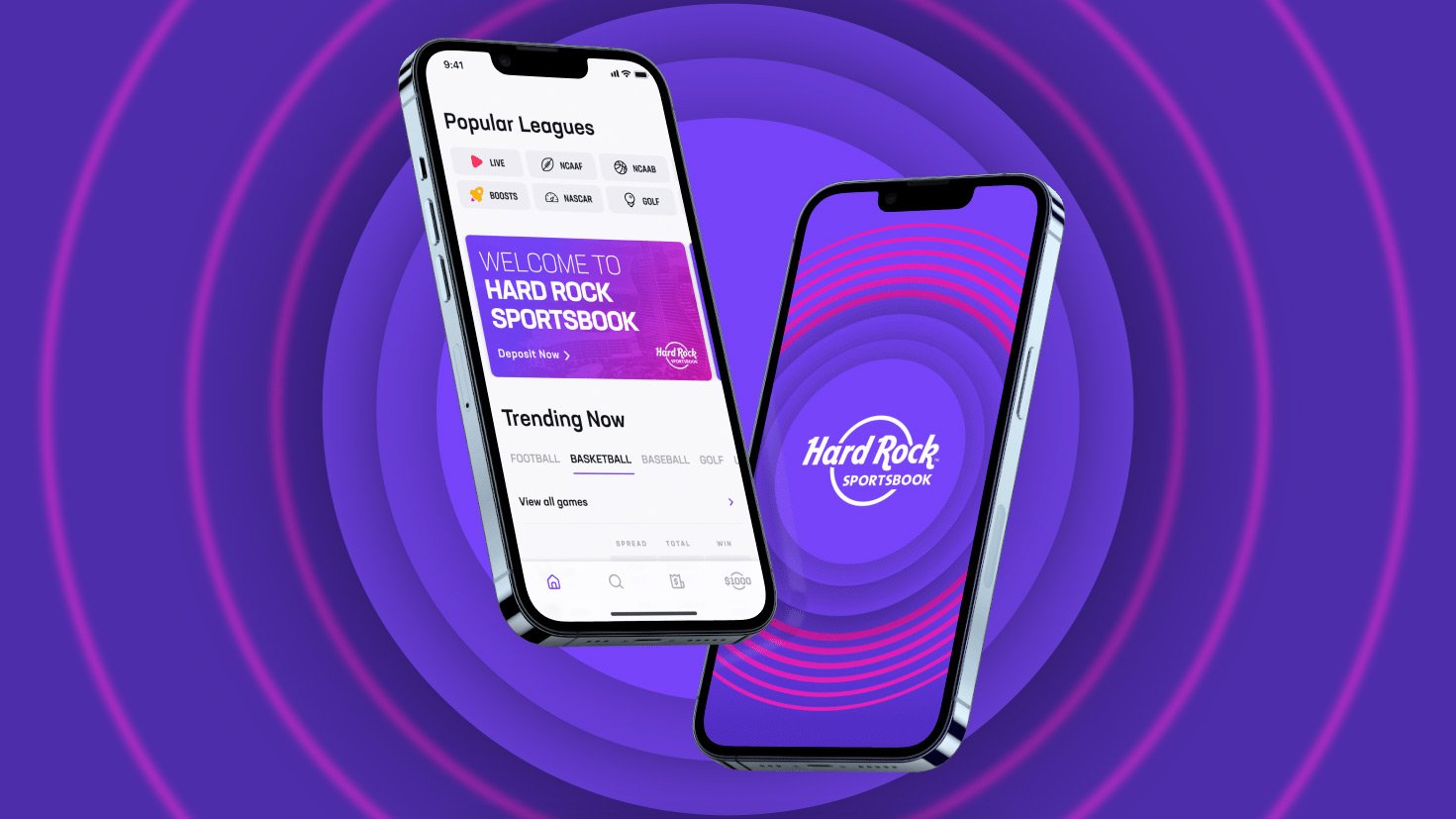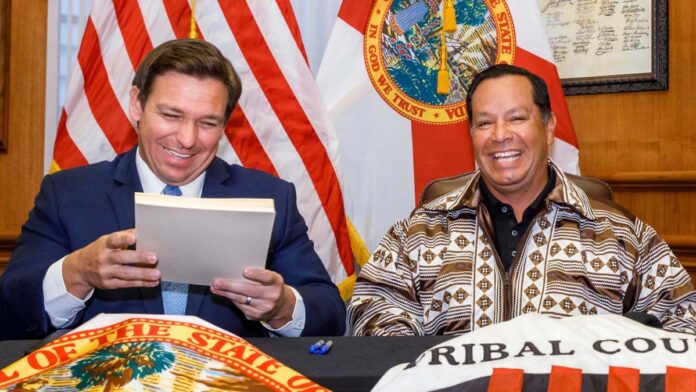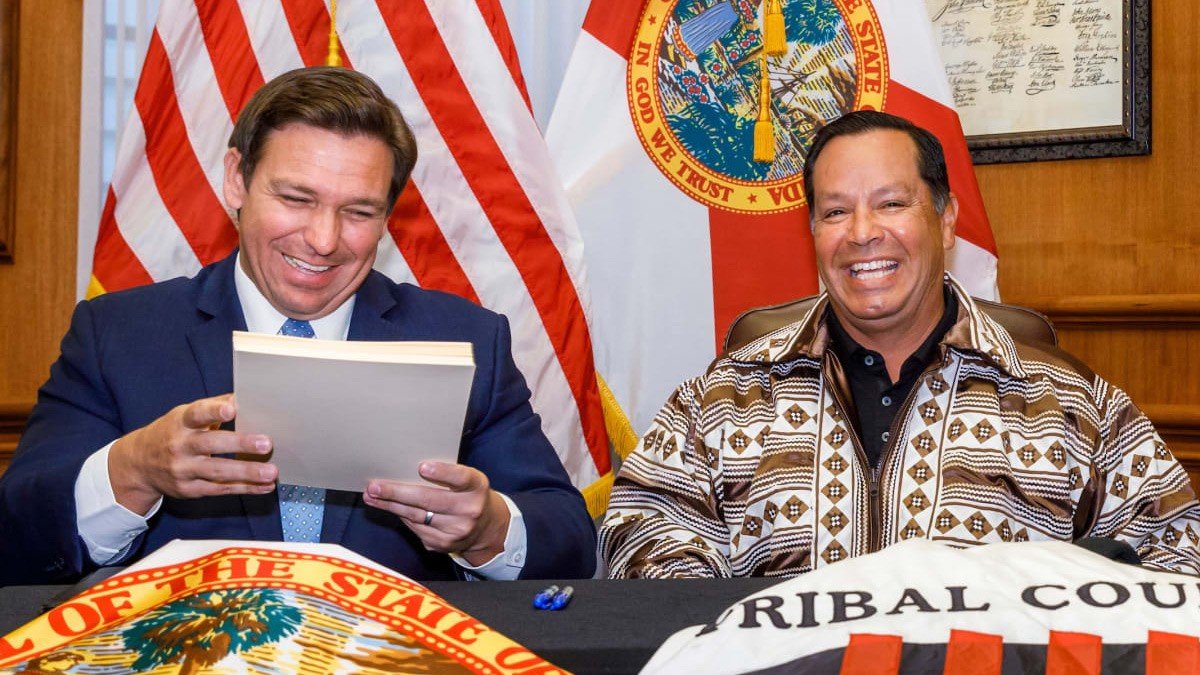Following a federal appeals court denial of a request from two pari-mutuel owners for a rehearing after a ruling that upheld a multibillion-dollar gambling compact, the companies have now asked the Florida Supreme Court to strike down the part of the agreement that gives the Seminole Tribe control over sports betting throughout the state, claiming it illegally expands gambling in Florida. The state lawsuit comes as the operators also seek a U.S. Supreme Court review of the compact in a separate case.
The petition was filed by West Flagler and Associates, which holds three jai alai licenses; and Bonita-Fort Myers Corp., which does business as Bonita Springs Poker Room in Southwest Florida. The challenge argues that the governor and the Legislature violated the state Constitution when they approved the deal in 2021 to give the tribe the exclusive right to offer off-reservation online and in-person sports betting throughout the state.
Gov. Ron DeSantis and Seminole Tribe of Florida Chairman Marcellus Osceola, Jr. signed the deal, known as a compact, two years ago and state lawmakers soon later ratified it. The deal included a “hub-and-spoke” plan designed to allow gamblers anywhere in the state to place bets online, with the wagers to run through computer servers on tribal property. The deal said bets “using a mobile app or other electronic device shall be deemed to be exclusively conducted by the tribe.”
Gov. Ron De Santis and the Seminole Tribe signed the updated compact in 2021.
The lawsuit filed Tuesday at the Supreme Court accused DeSantis and the Legislature of exceeding their power by allowing sports betting off tribal lands — without approval from voters. “This abuse of authority warrants this court’s review and correction,” Raquel Rodriguez, a Miami-based attorney with the Buchanan Ingersoll & Rooney PC firm, wrote in the 76-page lawsuit known as a “petition for a writ of quo warranto,” as reported by the South Florida SunSentinel.
“The amendment is an enduring grant to the people themselves — and only them — to authorize new gambling in Florida. The constitutional provision should be interpreted for sports betting as it exists today,” Rodriguez wrote. Under what is known as Amendment 3, expansions of gambling must be placed on the statewide ballot through the citizens’ initiative process.
The lawsuit accuses DeSantis and legislators of constructing the sports betting plan and an accompanying law in a manner designed to skirt the constitutional requirement for a statewide vote. DeSantis and lawmakers “sought to bypass” and “avoid the requirements” of the amendment “not by actually limiting sports betting to Indian lands, but by labeling the problem away,” the lawsuit says, as per SunSentinel.
This marks the second attempt at invalidating the compact by the pari-mutuel companies. In June this year, a three-judge panel on the U.S. Court of Appeals for the District of Columbia reversed a 2021 decision by a federal judge who halted the gambling agreement.
The federal appeals court ordered the Department of Interior to reinstate the agreement to give the Seminole Tribe and its Hard Rock brand a monopoly on the gaming vertical in Florida. The federal court left open the possibility, however, that the agreement could be challenged in state courts, which West Flagler is pursuing with its new petition.
Meanwhile, the tribe’s Hard Rock sports betting app remains in limbo. The tribe has been eagerly awaiting the opportunity to relaunch in its home state since it went live briefly in 2021. Hard Rock’s sports betting platform was live for just over a month before being forced to shut it down due to a court order. After the appellate court decision in June, the tribe began making plans to launch it again but has not announced a start date.

West Flagler is now also challenging the federal appellate court ruling, asking the U.S. Supreme Court to review the case and pause the launch of any sportsbook operation in Florida. It argues that if the decision stands, it will serve as a “blueprint for expanding gaming outside of Indian lands.”
On Monday, the Department of Interior filed a response to the West Flagler claims, saying the delay is unwarranted and there is nothing for the U.S. Supreme Court to review.
What does the new compact do?
Under its 30-year agreement with the state, the Seminole Tribe is given a monopoly to operate sports betting in Florida. The tribe, which will also be allowed to add roulette and craps to its casino operations, will in return pay the state at least $2.5 billion over the first five years of the agreement.
In addition to allowing for the potential operation of sports betting outside of tribal land, the compact also allows both Trump National Doral Resort and the Fontainebleau Hotel in Miami Beach to obtain casino permits without violating the tribe’s monopoly status.
Discussions have already begun between Jeff Soffer, owner of the Fontainebleau, and key legislators about legislation to authorize the transfer of the Mardi Gras casino permit to Miami Beach, according to the Miami Herald.
Since it filed the lawsuit in 2021, West Flagler sold its gambling permit at Magic City Casino to the Poarch Band of Creek Indians, an Alabama-based Native American tribe. West Flagler continues to operate a poker room at Bonita Springs near Fort Myers
















